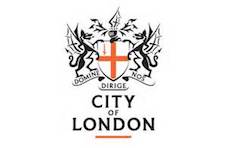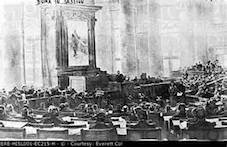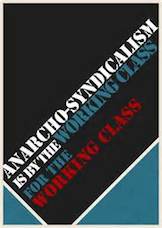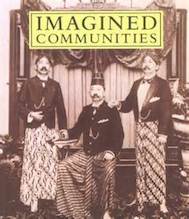John Tummon (Republican Socialist Alliance) responds to Murdo Ritchie’s (RCN) Promoting Republicanism (http://republicancommunist.org/blog/2015/02/24/promoting-republicanism/)
Murdo Ritchie’s ‘Promoting Republicanism’ is a very important contribution to something we Republican Socialists need to keep working on until we have a theoretically rigorous and internally-tested critique of the poverty of any socialist analysis that fails to incorporate a full understanding of democracy and republicanism; only when this is in place can we think about breaking through to a position of genuine influence on the Left, let alone wider society outside of Scotland.
I see Murdo’s ‘Promoting Republicanism’ as a key stage in that development – and a very welcome one at that – and my comments, including my attempted development of aspects of what Murdo has written, are put forward in that spirit. What I increasingly find is that the most interesting left thinking in Britain comes from Republican Socialists, which was born out by the impressive quality of discussion at the recent RSA AGM in London; much of what passes as debate within the rest of the British (certainly the English) Left is stale repetition and, within Left Unity, the recycling of stale certainties from past eras in the name of ‘doing politics differently’. Unless we think politics differently, a failed practice will recur.
I have few comments to make on the second half of Murdo’s article, from ‘A Secret Republic’ onwards; the description and analysis there of what the constitutional monarchy consists of in its broad and correct sense, and the distance between this and even a bourgeois republic, makes all the oligarchical decision-making which has been hidden in plain sight suddenly and wonderfully clear. This is a major step forward – it is a holistic summary of the British state.

Most of my comments are about the history of how this came about and the shortcomings of socialist theoretical understanding of this history, but I would like Murdo’s suggested further development of how contemporary conservatism is reproduced to be taken forward through a careful review of (i) what Gramsci wrote on hegemony [1] and (ii) the work of Raymond Williams [2] and (iii) the Glasgow Media Group [3] and (iv) others who have grappled with this crucial dimension of struggle. Political culture and the manipulation of consent is one of the woefully neglected areas of analysis and struggle, but there are some things to build on in our attempt to put this right.
In his second paragraph, Murdo sets out our task in fully substantiating the Republican Socialist argument. As well as the Left having barely scratched the surface of Republicanism, secularism and political culture, though, I think the evolution of the nation state and parliamentary democracy are two other key areas in which socialist thinking is woefully deficient and both require attention as part of our task.
For me, the second half of Murdo’s article is important because the essence of what Republicans need to get other Socialists to recognise is that a people who do not feel humiliated or oppressed at living under the rule of an oligarchy centred on the Crown, with limitless and untransparent discretion for the latter and no written rights for the former, are incapable of fighting consciously for socialism [4]. The British working class has consistently failed to respond, when called upon by sections of the Left, to use their vote because workers and suffragettes fought so hard for this right in the past; workers will not defend or demand democracy if that democracy is not republican, because only republican democracy gives a sense of genuine ownership and entitlement. The subject does not have the same sense of rights and obligations – of sovereignty – as the citizen and is more malleable as a result.
As soon as we unpick the dark corners of the Crown in Parliament, as Murdo has done so well, the long march of popular de-

politicisation and political disengagement in Britain becomes much clearer. Alongside their political impotence, arising from discretionary and unaccountable oligarchy, people who allow themselves to express love, regard or respect for the Monarchy, which millions do, have thereby cut themselves off from both any form of sustainable anger about oppression or exploitation and any thought of rebellion against power. A populist monarchy becomes the acceptable, celebrity face of oligarchy; the Windsors front the entire ruling class, sprinkling their magic dust in our eyes, helping to hide the oligarchy in plain sight. This is not ‘stagism’ on our part, but recognition of a massive barrier to any process of struggle resulting in the emergence of ‘a working class for itself’. Struggle with in-built ideological no-go areas, which is how the Left has treated republicanism, ends in accommodation and defeat; anyone who lived through the hysteria of the Falklands War knows how quickly a militant working class can be diverted into patriotism once the national narrative is summoned up in the guise of ‘Britannia’.
Equally, any student of the Russian Revolution knows how the abdication of the Tsar was instrumental in liberating the political vision of Petrograd’s working class beyond the food riots that ushered in Kerensky’s Provincial Government. Leninists who see Republicanism as some kind of en passant luxury in the greater scheme of things could usefully dwell on 1917 and ask themselves why it was that the Bolsheviks could not seize power in February after the desertion of many troops when called upon to quell the food riots – what was missing? (Clue ‘Lenin’ is not the answer!).
The nature of the British bourgeoisie
My first area of comment is about the need to go a little further than Murdo has regarding the nature of the British bourgeoisie; in particular, what differentiates it from the notional bourgeoisie modelled theoretically by Marx as well as from the actual bourgeoisies of Western European and other Republics. We agree that the British industrial bourgeoisie is politically weak, but whereas Murdo seems to ascribe this to its representatives being charmed and confused by the medieval antiquary and preferments of the Crown, I want to argue that this weakness has material roots – in industrial capitalists’ lack of relationship to and participation in the Atlantic and Indian Ocean Trade and the capital accumulation resulting from that trade.

From the late 16th century on, the Atlantic Trade was the greatest source of capital of its day, contributing around 7% of GDP per year, most of which ended up with bankers, the Crown and the new generation of merchant capitalists [5] who had escaped the limitations of Crown Charters and often extended into landownership and food production in North America. Simultaneously, the East India Company and it’s offshoots became a huge engine of capital accumulation and political power: until the Raj was imposed, following the 1858 Indian Mutiny, India was ruled by a huge, Crown-chartered, merchant capitalist corporation turning over massive profits [6] from cotton, tea and opium.
The late 17th/early 18th century political settlement that Murdo describes took place in the midst of these centuries of capital accumulation and reflected it in its content and in the nature of the alliance it cemented. Murdo has skated around the 1694 creation of the Bank of England, yet this event marked precisely the alliance between the Crown, the bankers of London and Edinburgh and the landowning aristocracy [7] that became the slowly evolving core of the British oligarchy and British imperialism. As Braudel has argued, capitalism was defined at this stage by trade, circulation and marketing, not by production, and so was its Bourgeoisie [8].
Because Britain was the first to enter the era of industrial capitalism yet had already undergone its political settlement, both it’s industrial capitalism and the resultant capital accumulation arising from it were constrained, shaped and absorbed by that settlement and by the imperialism and type of capital accumulation it grew out of.
Crucially, apart from Britain, no other large capitalist state began industrialisation after rather than before undergoing its decisive

political settlement: France assumed its modern nation state form in the 1870s in the first decade of the Third Republic, Germany in 1871 and Italy a decade earlier. The USA constitution came only a decade before Eli Whitney’s Cotton Gin revolutionised cotton production and two before the Louisiana Purchase, but it’s final and decisive political settlement did not really occur until the late 1870s – in the infamous ‘era of the robber barons’ after the Civil War against the Confederacy and the Plains War against the Sioux and Cheyenne had completed the process of capitalist pacification and facilitated the building of a transcontinental nation state with capitalist social relations throughout.
Due to wilful neglect, Socialists lack a properly differentiated analysis of each capitalist society; this lack is the cause of the ideological trauma the Bolsheviks went through upon seizing power in a largely pre-capitalist empire, circumstances on the extreme margins of the Marxist model and which bear out the crucial importance of the concept of combined and unequal development. In short, this concept should lead socialists to expect differentiation, including differences in class structure and class power related to the political configurations of polities. We should be so lucky!
For Britain, the inability of late 18th and 19th century industrial entrepreneurs to force regime change arose from being Johnny-Come-Latelies amidst a pre-existing carve up of power and wealth. One important dimension of this pre-existing power was landowning, which ensured that the landowning aristocracy owned the land on which mines were excavated, and on which mills and other factories, docks and cities were built, to the extent that one Cambridge College still owns the land on which Manchester was built [9]. Chief rents on all the office buildings, car parks and the rest of industrial capitalism’s built environment still go to the pre-industrial aristocracy, including one of the greatest landowners of all – the Windsor family [10].
As Jerry Jones’ research into landowning [11] shows, land is not taxed by value in Britain and only half of all British land is registered

with the Land Registry, 90 years old in 2015. Another researcher, Kevin Cahill, found that just 189,000 families own 2/3 of all land in Britain, 75per cent of which is owned by just 40,000. The Duke of Westminster’s 140,000 acres includes London’s Mayfair and Belgravia, valued today in £ tens of billions, if not more, whereas Britain’s 16.8 million house owners account for just 4 per cent of land. This is the actual profile of the Thatcherite illusion of a property-owning democracy – a mere taste of the succulent cuts monopolised by inherited wealth-holders.
The veil of secrecy that Cahill and Jones had to penetrate to find all this out [12] is still there for 5.6 million unattributed acres – about 10% of Britain’s land area. Secrecy and the Crown go hand in hand, as does land appropriation and distribution and the Crown. Most of the big private estates can be traced to appropriations and handouts from the reigning monarch in bygone days, particularly during the Norman Conquest, the dissolution of the monasteries, due to the enclosure of common land and following the Restoration. More recent and very lucrative sales to property developers have created the only land that no longer attracts Chief Rent.
Land ownership is a leading example of how secretive pre-capitalist power continues to determine wealth distribution and proceeds from rental income in contemporary capitalism, courtesy of the Crown and precisely because British radicals have never, since the 1640s, had or attempted a republican reckoning.
The oligarchical ownership and control of land continues alongside the late 19th century diversification of a proportion of aristocratic land into stocks, shares, bonds, bank holdings and other investments. A century ago, British financial interests, strengthened by this ‘gentlemanly capitalist’ fusion with landowners, prevailed over manufacturing interests by arguing that, even if Britain ceded key industries to rising powers like the United States and Germany, the City of London would remain the financial hub of the world economy.
Unfortunately, the British Left has consistently ignored this elephant in the room. The direct exploitation of wage earners by

industrial capitalists, though real and common enough in South Wales, the West Midlands, Lancashire, West Yorkshire, Newcastle, Durham and the West of Scotland, belied the fact that, even before Thatcher dismantled industrial Britain, consortia of institutional and other external private investment owned much of it. The textile industry was in long-term decline from the 1930s and the UK car industry enjoyed an Indian summer for over a decade after the Second World War halted car production in most of mainland Europe. Much of British industry was technologically and in terms of capital investment well behind the rest of the OECD even before Thatcher set about it. Yes, Celtic Britain and large parts of the north and midlands of England did used to be an industrial country, but that does not mean industrial capitalists ever ran it; they merely grabbed a small share of political power on the terms extended to them by an existing class alliance, before themselves morphing into financial wealth holders. Marx provided a model about how the engine of the productive economy worked differently under capitalism – through exploiting labour power – but it was the 20th century Left that exaggerated this into an imagined, ubiquitous social reality of a class of workers versus a class of direct exploiters. This crystallised in the International Socialists’ crude conception of class struggle as a conflict between workers and their capitalist overseers – society as the workplace writ large.
In conclusion, despite the Left’s rule of thumb picture, the British Bourgeoisie sits overwhelmingly on financialised wealth and rentier wealth in land and property, a long-standing reality not created by neoliberalism but strengthened by it. Ex-industrialists are among those who sit on financialised and rentier wealth, and the vast majority derive their wealth, both now and in the past, from trade, including of stocks, shares and bonds, and from investment in overseas production. That majority is part of a long-standing alliance with the Crown, topped off since the 1960s by the web of tax havens built from Crown Dependencies by the City of London [13].
 As Murdo puts it, the monarchy, aristocracy and bourgeoisie fused to create profound inhibitions to the extension of democratic development; the Industrial Bourgeoisie was merely the latest group to join and it’s post-settlement emergence and its material and political dependence on its elder and bigger partners is why there has never been a Bourgeois Revolution to build the nation state anew, sweep away the Woolsack, the Strangers Gallery, Black Rod, the public schools, First past the Post, the Corporation of the City of London and the Privy Council. Instead, the industrial bourgeoisie brought some new blood and became part of an incremental evolution from dynastic realm to nation state that left intact the entire edifice of unseen and unaccountable decision-making. There was no British Galbraith or Krupp, no Siemens or Ford, no giant industrial enterprises moving the means of production forward in the manner which marked capitalism out for Marx as a progressive interlude between feudalism and socialism.
As Murdo puts it, the monarchy, aristocracy and bourgeoisie fused to create profound inhibitions to the extension of democratic development; the Industrial Bourgeoisie was merely the latest group to join and it’s post-settlement emergence and its material and political dependence on its elder and bigger partners is why there has never been a Bourgeois Revolution to build the nation state anew, sweep away the Woolsack, the Strangers Gallery, Black Rod, the public schools, First past the Post, the Corporation of the City of London and the Privy Council. Instead, the industrial bourgeoisie brought some new blood and became part of an incremental evolution from dynastic realm to nation state that left intact the entire edifice of unseen and unaccountable decision-making. There was no British Galbraith or Krupp, no Siemens or Ford, no giant industrial enterprises moving the means of production forward in the manner which marked capitalism out for Marx as a progressive interlude between feudalism and socialism.
The Left’s Democratic Deficit
A 21st century republicanism needs to be clear on democracy, but democracy is so much part of contemporary rhetorical political parlance that it goes mostly unquestioned, unscrutinised and undefined. The British oligarchy hardly used the term before the 20th century, when liberal capitalism, suddenly pitched into a titanic struggle with Fascism and Communism, re-badged itself shortly after finally allowing women without independent property into the franchise. It became the watchword of Cold War warriors, who would have us believe that the Crown in Parliament merits this label.
But what basis does the British Left have for either claiming the mantle of democracy for ourselves or else defining or redefining it?

Ever since Lenin and Trotsky closed down the Russian National Assembly, after the first elections following the Revolution resulted in a victory not for the Bolsheviks but the peasant-based Social Revolutionaries, the Left has been open to the accusation that we favour faceless, untouchable, one-party rule, as opposed to government through a pluralistic parliament.
I am a socialist who does not believe either in “firm proletarian dictatorship discipline”, as advocated by Leninists, or the idea that it
is possible to get radical reforms out of our current political system that can restore the mixed economy and welfare state of 1945 – 1973. I explicitly reject both the notion that Leninism is a science and the notion that capitalism can be reformed sufficiently from within [14].
My politics is with Marx in not wanting to do away with a democratic republic, but Marx left his idea of ‘the dictatorship of the proletariat’ vague and lacking in political and social content, so it was instead shaped, quite differently, by Lenin, in the pursuit of an elitist ‘vanguardism’ – the idea that his party, a small minority of revolutionaries, had the theoretical means and insights to direct the working classes and act in their name and interest; that party, not the workers, became the dictatorship and did so before the Civil War. The democratic rights of the people, as enshrined for example in Stalin’s constitution of 1936, were a mere sham under the system Lenin and Trotsky put in place. Kronstadt, an atrocity led by Trotsky against the sailors on whose blood the regime came to power, foreshadowed the purge of the ‘disloyal’ Left in the 1930s USSR and the subsequent crushing of workers’ movements in East Germany, Hungary and Czechoslovakia. The rest of the Left, internally and externally, was crushed in the pursuit of Leninist logic.

Social Democrats were keen, especially during the Cold War, to point out the absence of basic democratic rights under this form of communist state that never withered away; instead, they told working people that the capture of state power through the ballot box would inevitably lead to socialism. Whenever they got their chance in government, however, they managed little more than to manage capitalism more humanely than the traditional parties, culminating in the postwar Atlee government in Britain. Socialism never came and, over the years, social democrats stopped talking about it and accepted capitalism fully. The Labour Party formally acknowledged this when it abolished Clause IV in the 1980s. The abrupt end of this 20th century chapter of British social democracy had been reached without any attempt whatsoever during its eight decades to critique the Crown in Parliament by the standards implied by the new notion of ‘democracy’.
So I am opposed to both these versions.
This split between communists and social democrats left a smaller tradition of revolutionary socialist democracy largely forgotten, a tradition dating back to the history of the early labour movement that preceded the setting up of ‘proper’ social democratic parties, including ideas from Chartism and ‘Utopian Socialism’ about communitarianism, co-operation and self-management; ideas largely ignored by social democratic histories. These socialists also often preached and practiced the liberation of women and a radical gender politics that would often not be matched by the left until the late twentieth century. They designed socialist communities and housing for working people – the hard thinking about what socialism should be like in its social relations – the very thinking that the Leninist tradition says should be left until after the revolution.
Some of these early nineteenth century traditions survived and were further developed before the First World War by the anarcho- syndicalist movements of direct industrial action and workers’ self-organisation, as distinct from the conspiratorial type of anarchism. The anarcho-syndicalists mistrusted and rejected all centralist organisations and institutions, including political parties, parliaments, church and state; this marked them out in opposition to both the social democrat and communist traditions. I share that distrust.
syndicalist movements of direct industrial action and workers’ self-organisation, as distinct from the conspiratorial type of anarchism. The anarcho-syndicalists mistrusted and rejected all centralist organisations and institutions, including political parties, parliaments, church and state; this marked them out in opposition to both the social democrat and communist traditions. I share that distrust.
In the revolutionary period between 1917 and 1923 council republics were the aim of a number of socialist revolutionaries in Central and Eastern Europe. They advocated a more radical and more direct democracy which often went hand in hand with demands for greater control over MPs, championing plebiscites and referenda as well as suggestions for the rotation principle in leadership to prevent the emergence of a permanent leadership. In 1921, some of these socialists came together in the International Workers’ Union of Socialist Parties, also known as ‘Vienna Union’ [15]. Throughout the 1920s and 1930s a string of independent socialists of this type defied the stark dichotomies between communist dogmatism and social democratic reformism.
These socialists saw democracy not just as a political process but as a mechanism of consensus decision-making and balancing out conflicting interests which needed implementing at all levels of society. The key question for them was not about political power but about social power. Democratic processes needed to be adopted in all power relationships – in the family, the workplace, in neighbourhood groups and even in the army. Ideas about industrial democracy, workers’ control, socialisation and workers’ self-management were particularly prominent among left-wing socialists who refused to commit themselves either to the reformism of social democracy or the undemocratic antics of the Russophile communists.

It is among groups of left-wing social democrats, independent socialists, guild socialists, anarcho-syndicalists and unorthodox communists that we find most concern for the fostering of a democratic civil society in the inter-war period. They wanted to empower working people in their everyday lives. They believed that people had to practice democracy on a daily basis rather than delegate responsibility for decision-making to elected representatives or a party vanguard. They had to be encouraged to take control of their lives in a more direct way. Localised direct democracies in which the people could realise democracy in all spheres of life were to be preferred to the deadening weight of heavily bureaucratised parties, trade unions and states. Rosa Luxemburg’s opposition to Leninism was rooted, above all, in different ideas about the democratic organisation of society.
After the Second World War many of these concerns surfaced again with the post-1956 emergence of the first New Left, with the advances of the student movement in the 1960s, with second-wave feminism, with the growth of green/ecological movements in the 1970s and with the revival of notions of active citizenship in communitarian thought in the 1980s and 1990s. 1956 brought various attempts in Eastern Europe to democratise the stalinised people’s democracies. Reforms went furthest in Poland and Hungary and included economic, cultural and political liberalisation as well as experiments with grassroots democracy that eventually resulted in the declaration of a multi-party state in Hungary on 30 October 1956, just before the Russian tanks rolled in.
The significance of 1968 for the left in Europe and North America lay in its championing of anti-authoritarianism and its formulation

of a new democratic politics of the everyday which declared proudly that the personal was the political. It highlighted the agency that people had over their lives and contrasted such practices of self-actualisation with the alienation produced by passive consumerism. One of its key concerns was the liberation of women who arguably suffered most from the authoritarian regulation of gender relations.
The Green movement picked up the criticisms of communist and social democratic notions of progress that had been voiced by left-wing dissenters in the 1950s and 1960s. Quality of life, they argued, could not be measured simply in terms of maximising economic growth levels and rising consumption levels. The Occupy movement is the most recent to take up the baton of re-envisioning democracy in terms of process – participative consensus building – rather than the single National Assembly model.
The social order envisaged by communitarians often involved small decentralised communities in which individuals know each other and interact with each other on a basis of shared norms and values. Communitarian thinkers have also criticised social democrats and communists for being one-sidedly concerned with how to optimise the equal distribution of resources. In doing so, they neglected the central question of involving the people in decision-making processes about such allocations of resources. This is also why the traditional left has been incapable of putting forward a convincing theory of political democracy that puts the active engagement of citizens centre stage.
This is the socialist tradition that I come from and the only one that has the ideas to defeat the bourgeois parties on their most vulnerable terrain – the terminal decline of their so-called democracy and their vigorous pursuit of consumerism and growth for growth’s sake.
A deep distrust of our politicians has developed, and more and more of us doubt whether they can do anything about the state human society is in or, even if they could, whether they are to be trusted to get it right. Politics is volatile and protest burns ever more brightly, and briefly, but seems never to get past the point of what it is against.
 Socialists, on the other hand, aim to strengthen the bonds of solidarity in society (social, intergenerational, across cultural and other differences). Socialism, because it is built around equality and on people working and deciding things together in pursuit of a common good that people themselves define, injects meaning into life and into work, where the product of work is owned in common, so everyone has a stake and takes responsibility for their part in the greater whole. It provides material security via the social wage and production and distribution based on need and, by building up the values of mutuality and helping each other in time of need, develops psychological health and a self-confidence rooted in having a clear and valued role within a supportive, cooperative community.
Socialists, on the other hand, aim to strengthen the bonds of solidarity in society (social, intergenerational, across cultural and other differences). Socialism, because it is built around equality and on people working and deciding things together in pursuit of a common good that people themselves define, injects meaning into life and into work, where the product of work is owned in common, so everyone has a stake and takes responsibility for their part in the greater whole. It provides material security via the social wage and production and distribution based on need and, by building up the values of mutuality and helping each other in time of need, develops psychological health and a self-confidence rooted in having a clear and valued role within a supportive, cooperative community.
Politically, everyone under this version of socialism would have the right to participate in deciding how the wealth of society is used and how production is planned to meet the needs of all and to protect the natural world on which we depend. We reject the idea that the undemocratic regimes that existed in the former Soviet Union and other countries were socialist, because they set up no structures to allow this to happen.
Marx argued that proletarian democracy started from the assumption that the formal democratic mechanisms had to be filled with social content. Furthermore, political democracy was in need of being supplemented by the democratisation of power relationships in the economy and in society as a whole. The council democracy of the Paris Commune was to provide a model for Marx’s understanding of a genuine proletarian democracy.
Contrary to Leninism, socialism has to be based on constitutional government that guarantees civil liberties to all, made possible by

dismantling the existing state machinery and replacing it by a new, smaller state apparatus built from below – a representative government, with democratically elected bodies at the neighbourhood, community, regional and national levels. In all of these, representatives would be fully accountable, which means they are recallable at any time and have to account to their electors, as a collective, for their decisions at any time. Even if not recalled, they can only serve as a representative for a limited time period, and cannot be re-elected. This limit is to stop the creation of a permanent political class, which would otherwise become distant from the people, as we see now. Political parties are unnecessary for the purpose of making decisions on the basis of the common good; in fact they work against it, and would be phased out once socialism is established. Socialists aim to develop such democratic and accountable structures and practices in the here and now as well as after capitalism has been dismantled, in preparation for diminishing the role of the state in society.
This type of society calls for an active citizenry, as against the widespread disillusionment with politics under late 20th and 21st century capitalism, with its narrow and elitist version of democracy. I believe that if people are given real power to decide the things that matter to us on a regular basis, from neighbourhood and workplace level to national level, and are given the information on which we can make confident judgments, then we will attend meetings, respond to Internet questionnaires about policies and play an active part in running society. This, I submit, is republican socialism’s alternative form of democracy – actual participation where people can see how their activity makes a real difference, rather than just passively putting a cross on a piece of paper every 5 years and then watching the politicians break the promises they made in order to get elected.
For me, this is the political content of the Social Republic, as distinct from the notion advanced by the earliest Republicans – of the late 18th century and 1848 – that a single National Assembly elected by all the people is sufficient on its own. If we do not go further than this, our notion of Republicanism will lack dynamism and development, and remain rooted in the ideas of Bourgeois Republicans of the past.
The Social Republic: an endpoint for us, or an adjunct to Dual Power?

Reform and Revolution are the stark alternatives offered by Leninism and social democracy. We either submit ourselves to the illusion that we can radically reform capitalism in the interests of working people to a point from which it cannot spring back to what it is now and has been for all of its history, or else we commit ourselves to the need for a violent seizure of power along the lines of Petrograd in 1917 and to the tightly-disciplined vanguard party model developed by Lenin which went on to monopolise political power thereafter! In both cases, it is a case of a self-appointed elect doing things over the heads of and in the name of the working people.
Is this really true? Are there just these two dismal alternatives?
Real history shows more variety than either the reformists or Leninists would have us believe. The Cuban revolution involved hardly any violent overthrow of the existing order, a template repeated during the 2012 Arab Spring, at least until Syrians got involved; large-scale social change, including the expropriation of land and factories, was well underway in Spain in 1936 with the existing central state in place. Workers Councils in Europe, as the First World War came to a close, brought about a situation described as ‘dual power’, in which the regime’s opponents were organising many of those aspects of life and work that concerned them most, quite independently of the regime and its state apparatus. We saw a more localised example of this in the Paris Commune and in Free Derry during the ‘Irish Troubles’ of the 1970s and in the liberated zones of Mozambique during their war of independence; the same has long since been true of the Zapatista stronghold in Chiapas in Mexico.

All these variations on the theme of Dual Power happened when the struggle against the regime was able to exercise partial politicalpower, a power that emerged incrementally, either in the form of geographical ‘liberated zones’, as in post-war guerrilla struggles in Arica or else in the form of liberating various economic and societal functions from the monopoly of the state.
Of course, such a Dual Power situation cannot remain unresolved forever, although there are some examples of it going on for years rather than months. The point is that there is no reason to assume that it is always going to be resolved in the manner of Petrograd in 1917 or Santiago in 1973, by a frontal attack on the key state institutions and their military defenders, followed by a war against a counter-revolution. Rulers can flee and have done so on many occasions, compromises have been negotiated and held until the Balance of Power changed fundamentally and one side moved to crush the other. Such times are muddy and messy and the Leninist argument for a single fundamental blueprint does not stand up to the historical variety.
We need to stop conflating revolution – the wholesale transformation of society – with insurrection: the attempted seizure of state power by frontal and violent confrontation in the streets and public buildings of capital cities. Revolutionary change usually happens both before and after the change in formal political control and that is the process – the big picture – that needs our attention, far more than the unrelenting focus on preparing a ‘vanguard’ of the elect for an imagined set-piece confrontation that hardly ever happens in anything like the way it is depicted in the Leninist imagination.
Dual Power assumes that a substantial degree of disintegration of existing state power is taking place in response to the people demanding and organising an alternative way of running society, but strategical thinking based on the theory of pushing this forward incrementally until the existing state’s writ no longer runs within most or the most crucial areas of organised life is seriously undeveloped. This theoretical underdevelopment has occurred not because the proposition is naïve but because of the straightjacket imposed on the western Left by the Leninist-social democratic dichotomy, which has been loud and tribal for such a long time that thinking outside the box has not really happened.
For me, this I where the Social Republic comes in. The time has come to re-examine what we mean by socialism, how we want to counterpose it to capitalism and what strategy we intend to adopt for achieving it.

So, when in Berlin after the First World, two rival Republics were declared within a mile of each other on the same day – one by the SDP leader Friedrich Ebert ( ‘I hate the Social Republic like sin’) and the other by the Spartacist Karl Liebknecht – would we as Socialist Republicans have supported Liebknecht because that Republic, too, involved a National Assembly, or because this Assembly was not an end in itself, but a necessary means of taking some national power, in order to prevent the formation of a counter-revolutionary Freikorps and to support, strengthen and develop the network of Workers and Soldiers Councils and Council Republics, before withering away in line with the Marxist project for human emancipation? This is how I conceive of the Social Republic – not as a final destination that leaves a permanent political class and political parties intact, but as a central source of power that guards and enables Dual Power to develop decentralised political institutions and processes so that centralised power can be gradually pared back to become an organic part of a society in which political decision – making takes place at all levels.
In this way, I distinguish between the Social Republic and the Bourgeois Republic; the latter is merely what the USA, Germany and France have – capitalism in a Republicanism form, and very desirable and necessary it is, too, for the reasons Murdo has set out.
Do we believe in the nation state or internationalism?
This takes us straight to the other main way in which republicanism has to be re-imagined compared to the thinking of 19th and most 20th century republicans.
Socialists can only properly respond to imperialism, global capitalism and world poverty if we are very clear on how they affect each other. Leninists claim that the lever for international revolution and therefore for the achievement of socialism lies with the working class in the advanced, industrialised world. This is substantially different from Marx’s own thinking: “The English working class will never accomplish anything before it has got rid of Ireland. The lever must be applied in Ireland. This is why the Irish question is so important for the social movement in general”. Leninism offers to people struggling in poorer continents only a largely Eurocentric analysis of something – capitalism – that consigns them to peripheral roles in a drama scheduled to unfold elsewhere. Imperialism, to Leninists, is merely a stage in the history of capitalism.

Social democrats, on the other hand, have nearly always taken a nationalist view of the world. Both the Labour Party and British trade unions have a terrible record on international issues. The Clement Attlee government they see as the epitome of what they want to return to was firmly dedicated to the furtherance of the British Empire, used its bombers to hold off the Greek revolutionaries and played a key role in starting the Cold War and the nuclear threat. No meaningful internationalism is possible from a Left Reformist perspective, because their political philosophy is thoroughly nationalist and has always been so.
Socialists who are neither social democrats nor Leninists recognise not only that imperialism shapes the world order in its economic, political and cultural aspects, but also that people in the imperialised countries struggling against it affects our ability to achieve socialism here. We cannot win unless they win.
If socialism is set up in some countries but not in the majority, poverty and imperialist exploitation will still be the international norm. Where there is little to share, socialism will have difficulty working, but where material abundance already exists and is simply badly distributed or expatriated by imperialism, socialism can flourish. Socialism cannot work without industrialisation, but where it has occurred, it can. Socialism can’t work if complex organisations for producing and distributing goods have not already been created, but where they have, it can. All the experiences of backward nations, such as China and the Soviet Union, where these conditions never existed, simply have no relevance to what we could do in the 21st century.
Even so, socialism has to be international if it is not to become National Socialism, i.e. an egalitarian autarchy that devolves to socialism in one country. The long-term and fundamental interests of working people are, ultimately, the same everywhere, but the divisions between us under imperialism are material and ideological. Socialists reject the idea that there is a national solution to the problems of capitalism and stand for solidarity and cooperation between the people in Britain and elsewhere. We will work with others who support the struggles of people in other parts of the world against their exploitation and domination by our rulers. If we fail to make this a key part of political practice and campaigning work, Republicanism will become an essentially nationalist project.
So if we are internationalists who oppose imperialism, how does this relate to our call for a republic in one country?

The emergence of a world composed almost wholly of nation states is a 20th century phenomenon that is barely recognised, let alone understood, by academia or the Left. Benedict Anderson and Andreas Wimmer are exceptions, providing insights and analysis rooted in imaginative research. Anderson’s ‘Imagined Communities’[16] shows how ‘Print Capitalism’ created a mass literacy around vernacular languages, enabling people to re-imagine themselves as members of national communities with a common origin and then to assert the right to self-determination, on the basis of that cultural commonality.
Wimmer[17] has built on this to show how ethnic and linguistic rivalry and tension was intrinsic to the formation of nation states, with their exclusivist notions of sovereignty, resulting in wars of secession, civil wars and wars on neighbouring states in the name of liberating compatriots from alien rule, with only the richest states able to provide sufficient political and material compensation to their minorities to prevent the politicisation of ethnic or linguistic separatism. The neoliberal era, with its relentless attacks on public spending, has consequently put the continued loyalty of national minorities under duress, most notably in Slovakia, Scotland, the Baltic states, Transcaucasia and Catalonia and. Conflicts based on competing identity have been too commonplace in the century of the nation state for socialists to accept the nation state as the template for human emancipation.
By contrast, several of the multi-ethnic empires that dominated the world for centuries before the First World War consciously and, on the whole, successfully pursued inter-community tolerance and an acceptance of diversity (Moghul India, Safavid Iran, the Ottoman Empire and the Austrian-Hungarian Empire were leading examples). Not just this, but the more recent formidable efforts made by the Soviet Union and the European Union to provide a framework of policies, resources and values to facilitate inter-community tolerance and an acceptance of ethno-linguistic diversity as the basis for an overriding identity contrast sharply with the record of nation states.
Of course, as socialists, we do not support top-down forms of state such as empires or caliphates, but that should not lead us to ignore

the broader point – that large, multi-ethnic groupings or federations of peoples, each of which is guaranteed almost total self-determination in exchange for their tolerance and promotion of diversity and pursuit of the overall good are a more advanced step towards global socialism than the war-ridden world of 200 odd nation states. Putting aside the politics and behaviour of ISIS, it is not their atrocities that have brought western military experts and hardware down upon them, but their attempt to destroy the framework of nation states imposed upon the middle east by Britain and France at the end of World War One, all the better to rule them by. I support that attempt at reconfiguring the political framework of the middle east at the same time as shrinking in horror at the prospect of ISIS imposing a Caliphate on their terms.
Most of the nation states dependent on western imperialism for loans and political support for their oppressive regimes, subjected to structural adjustment and to buying western arms, are republics. Most of their peoples lack meaningful sovereignty, material security and civil rights, hence the Arab Spring. Republican Socialists must therefore be clear how we relate calling for a republic to our internationalism:
Just as the social republic is a pre-requisite for building socialism within a dual power situation, so the bourgeois republic is a pre-requisite for the development of a working class for itself within capitalism and, because of capitalism, the continued oppression of peoples within republics is inevitable and has to be contested through class struggle. That class struggle will only come to a secure emancipatory resolution with global socialism and the withering away of all forms of the state.
[1] http://marxisttheory.org/antonio-gramsci-theories-of-hegemony-civil-society-and-revolution/
[2] http://www.tree-genie.co.uk/raymondwilliams/PDF/RWSNewsletter2.pdf and http://newleftreview.org/static/assets/archive/pdf/NLR16402.pdf
[3] http://glasgowmediagroup.org/
[4] http://www.bbc.co.uk/news/uk-18237280
[5] ] “Atlantic trade generated large profits for a segment of the bourgeoisie in Western Europe, and this group could demand, obtain and sustain significant institutional reforms protecting their property rights. With their newly gained property rights, the bourgeoisie of Western European nations invested more, traded more and spurred economic growth”, from http://dspace.mit.edu/bitstream/handle/1721.1/1857/4269-02.pdf
[6] East India Company “accounts registered with the British parliament show revenues rose from over £8m in 1794 to £13.5m in 1803.The value of this today is very difficult to calculate, whether you go for value in wages, prices, or real income, but that 1803 profit could be calculated as high as £48bn in today’s money – a reasonable guess might be £20bn”, fromhttp://www.bbc.co.uk/news/magazine-19077733
[7] The Crown was constrained by the Bill of Rights from levying taxes without parliamentary consent. The Bank of England enabled William to pay for his French War via a loan of £1.2 million at 8% interest plus £4,000 management expenses. Queen Anne later made this Bank a Monopoly.
[8] E Braudel (1979) Civilisation and Capitalism, 15th to 18th century (London)
[9] Trinity College has invested billions in property over the years, and owns sites as diverse as the Port of Felixstowe and industrial parks. In 2005 Trinity was worth £621million – the same as Manchester United and in 2009 put in a bid to buy the O2 Arena.
[10] The re-badged House of Saxe-Coburg Gotha, a regional German dynasty hidden by in plain sight from volunteer and conscripted troops during a world war against another branch of German royal blood; the Saxe-Coburg Gotha House, which included the infamous Leopold, the butcher of 11 million Congolese, was itself a temporary fix to solve the inheritance problem caused by Victoria being a Hanoverian woman, thereby showing that the Crown in Parliament will use broad discretion to get a figurehead from wherever it can to front up the oligarchy – in this case Prince Albert’s blood line.
[11]http://www.labourland.org/downloads/papers/HousingCrisisPaper.pdf and http://www.labourland.org/downloads/papers/WhoOwnsPaper.pdf
[12] During the course of piecing together information from press cuttings, and records of wills and estates, Cahill heard about a ‘second Domesday Book’, a report submitted to Parliament in 1876. He asked the Royal Agricultural Society if they had a copy. They assured him that there was no such thing. In fact, as Cahill discovered later, the Society possessed several copies in its library. The Country Landowners Association at least admitted to having a copy but refused to let Cahill see it. Eventually he was able to obtain a copy of extracts from Ealing library, and later a view of the whole thing in the Devon and Exeter Institute. Any organisation with ‘Royal’ in its title has overriding loyalty to the oligarchy.
[13] Set out in detail by Nicholas Shaxson in his book ‘Treasure Islands’ – http://treasureislands.org/
[14] This section is taken very largely from sections of a 2-part article I contributed to the Left Unity website in 2014
[15] This argument is developed in more detail by Stefan Berger in Communism, Social Democracy and the Democracy Gap, 2002
[16] http://books.google.co.uk/books/about/Imagined_Communities.html?id=4mmoZFtCpuoC
[17] http://www.princeton.edu/~awimmer/WavesIntro.pdf
